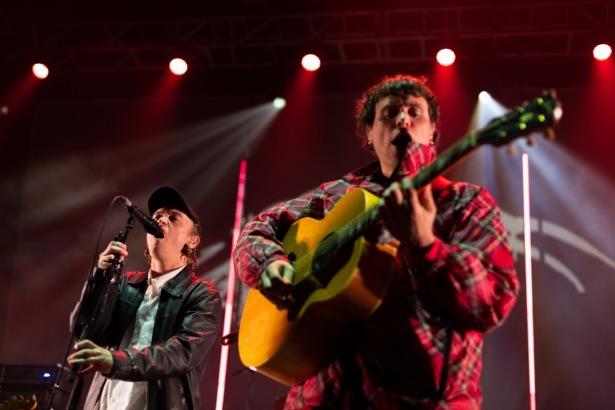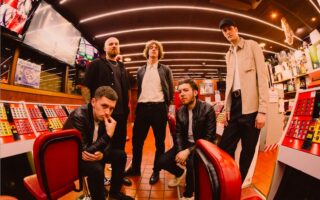
DMA’s live in London (Alessandro Gianferrara for Live4ever)
When Oasis split in 2009 it was hard to escape the feeling that it would be temporary; the Gallaghers were famous after all for their fraternal strops and they’d recently made a partial return to form in Dig Out Your Soul. So, everyone waited. And waited. And waited.
For the people they left behind there was no ready made replacement. This wasn’t simply a case of turning to another band; in the likes of Wonderwall, Rock N’ Roll Star and Supersonic many saw and heard reflections of themselves, a connection which was far deeper than just music.
As time has passed however, new standard bearers for this under-served community emerged, groups and singers who’d developed largely outside of the industry’s ecosystem. Now, acts like The Courteeners, Blossoms and Gerry Cinnamon all sell out arenas and stadiums and yet remain largely unknown outside of what is almost an underground following, with by contrast what was once known as indie rock jagging sharply towards artier, less traditional landscapes during the last eighteen months.
Formed during 2012, DMA’s – a Sydney based trio made up of Tommy O’Dell, Matt Mason and Johnny Took – have emerged as another leading light in this anti-movement. Adopting a work ethic that you sense their fans would approve of, they’ve toured hard and let image be another band’s problem. With a belief in authenticity at their core, they’ve also made virtues of writing hooky, melody-strong tunes and doing shows which are about bubbling up with mates and temporarily forgetting the world outside.
As the release of their new album The Glow is finally on the horizon, Live4ever caught up with Tommy as we talked lockdown, their club-inspired new ideas and why Britain has taken them to their hearts.
How’s lockdown been treating you? Australia seems to be a little ahead of the UK and US in terms of getting back to normal.
Sydney is getting a bit more normal yeah – pubs and cafes are open. Lockdown has been alright, we’ve been writing new music, working on a few different projects and trying to stay connected with fans through online gigs and stuff.
What’s been different? How have you been adapting to the ‘new normal’ in terms of connecting with the fanbase and performing?
Well we did a lot of isolation performances and streamed stuff, we’re planning a few Q&As too. I think we’ve done OK in terms of staying connected – we had our Brixton Academy set released which was sick. New normal…I dunno, just making the best of a bad situation really, isn’t it?
The COVID situation had delayed the release of the new album and the tour to support it. Is this just a case of, ‘We’ll carry on and do the same thing when we get the opportunity’, or in the interim have you decided to approach things differently once it’s released?
Once we can play live again we are gonna smash it wherever and whenever we can! Guess that’s kinda the same approach we usually have…
The new album (The Glow, released on July 10th) seems to have a much more electronic feel to it. How did that come about?
We’ve always loved electronic dance music so it was just a matter of time before we made an album like this. But in saying that, there’s still a strong focus on big melodies and honest lyrics. We won’t ever drop those aspects of DMA’S, that’s fundamental to our core.
You’ve talked about how working with Stuart Price on this record as producer helped you explore that side of your music. What was different?
The bones of our music will always be anchored in traditional songWriting structures – writing on an acoustic or piano – Stuart helped us on a production level, experimenting with different sounds. There are so many different ways a song can go after it’s written, so working with Stuart opened up some doors.
Life Is A Game of Changing was partially inspired by Johnny’s time living In Edinburgh…
Tooky wrote a lot of tunes when living there, he was super inspired by the new environment and meeting new people. Scots and Aussies have a lot in common.
Notably you’ve taken that a step further, with Martin Buttrich remixing Life Is A Game of Changing and giving it a much more dance orientated feel. Are the lines between ‘rock’ and ‘indie’ still there anymore? Do you feel they’re just artificial anyway?
I think they’re artificial yeah – people just use those words to categorise bands. There’s so much more to music and a band’s structure, and songwriting influence.
You’re not a band that makes political music as such, but does the new album try to inspire people to think differently?
I think songs can take on their own different meanings for people – that’s the beauty of music. People can take the music, process it, and however it makes them feel makes the song theirs/ They can personalise it how they want.
Do you think that British music specifically has a bigger influence on your work than stuff from Australia?
For me yeah, but for Tooky and Mason no way. Australian artists such as Paul Kelly to name just one have had huge impacts on them.
If you could work with another artist or band who would be your first choice?
At the moment I’d like to do a song with Mike Skinner, but there are so many people I would love to work with; Underworld too would be sick, the list could go on forever.
Acts like Gerry Cinnamon, with no label and little or no means of promotion, have become very successful, especially in Britain. It’s a similar story for more traditional bands like The Courteeners and Blossoms. There’s obviously a large, loyal base of kids who care more about the music than what tastemakers think. Is this sort of audience specific to Britain, or are they more representative of the fanbase across the world?
These values are reciprocated everywhere, but I think Britain in particular has a strong aspect of this to its music fans. People aren’t always relying on what the radio plays them; people are keen to get out there to gigs and discover music for themselves. I think it gives fans like that an ownership, or like a sense of camaraderie of the music they love. It’s special.
Australia has a really vibrant and diverse music scene just now – from Courtney Barnett to Rolling Blackouts Coastal Fever, Hatchie, Stella Donnelly, The Chats, Dope Lemon…Who else should we be listening to and why?
Love all those groups you mentioned – Royal Headache is another top band; Green Buzzard, Planet and Julia Jacklin are also great. The Laurels too. They’re all honest artists that make great music.
We understand you’re Everton fans – are you excited the Premier League has returned?
Yeah, still getting used to the no crowed thing but f**k it they’re playing so whatever.
Finally, we’d normally finish an interview with a question about what’s next, but instead, have the last few months changed how you feel about being together, as a band? Have the circumstances changed your relationship with the fans and each other?
The last few months have made me realise how important music is to people. Even if things are really s**t in life, people can always turn and escape to music, and for that we are all proud to be able to help in some form.
As for our own relationships, we’re all still tight, but I think we’ve realised even more that our music carries an importance to some people, which is a hugely humbling feeling.




